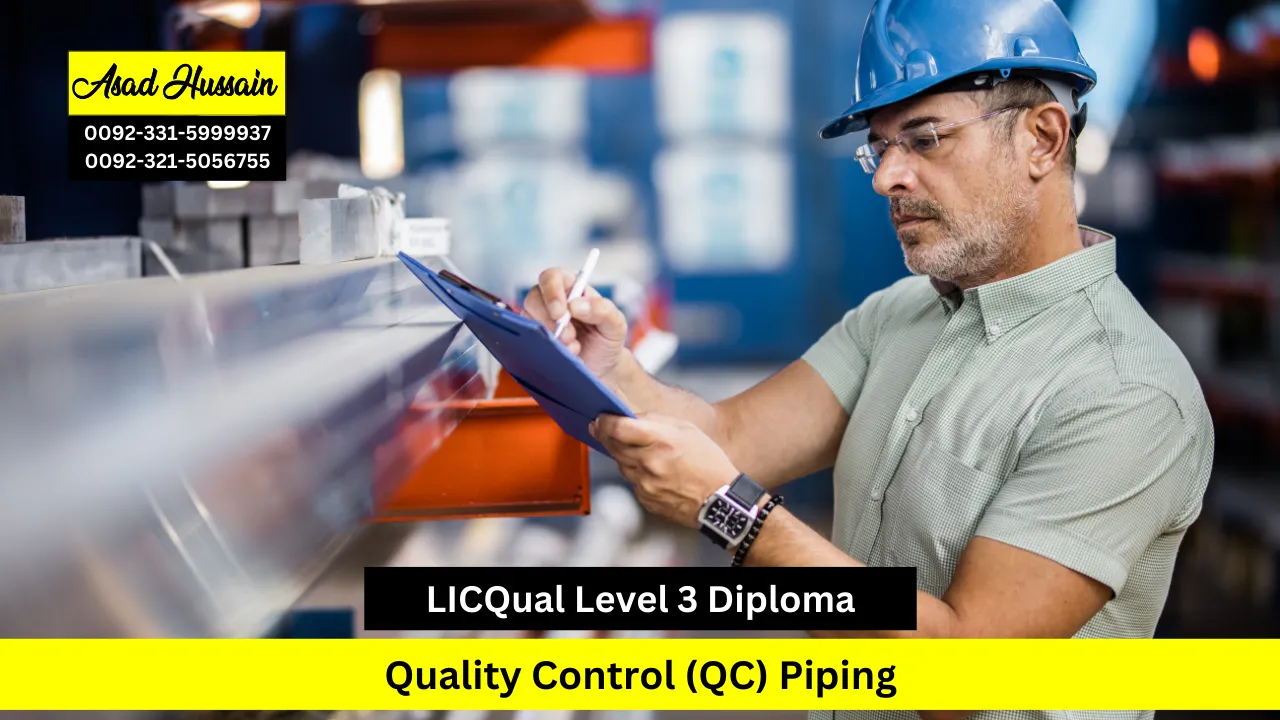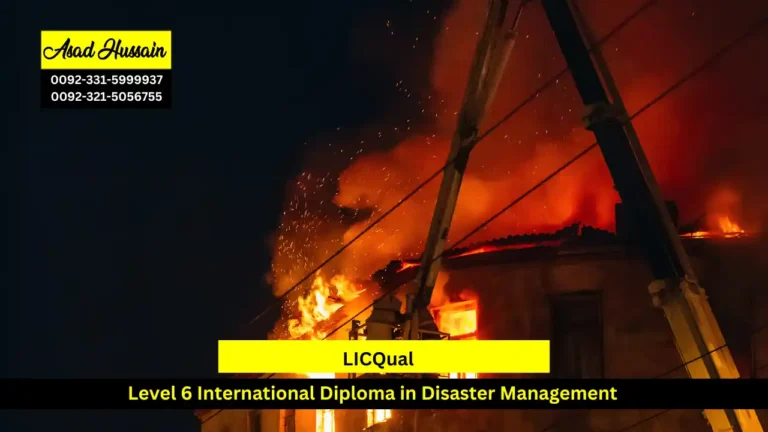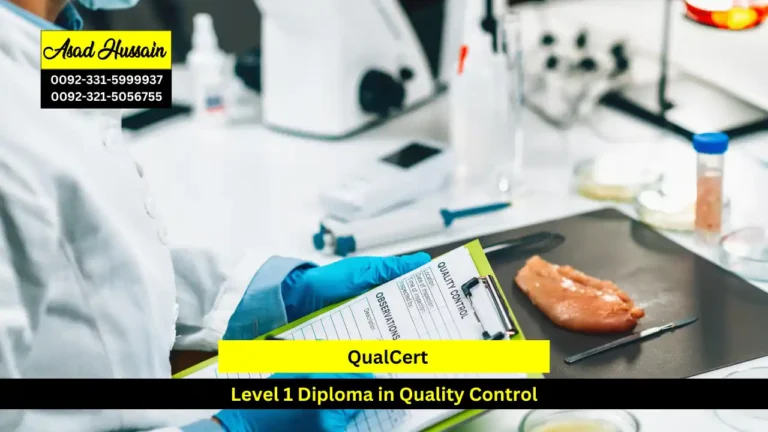Quality control in piping systems is a critical aspect of engineering and industrial operations, ensuring that pipelines meet rigorous standards of safety, reliability, and performance. The LICQual Level 3 Diploma in Quality Control (QC) Piping is designed to equip professionals with the essential knowledge, skills, and practical expertise required to oversee the quality and integrity of piping systems across industrial, manufacturing, and construction sectors.
LICQual Level 3 Diploma in Quality Control (QC) Piping provides a comprehensive overview of piping QC principles, inspection techniques, regulatory compliance, and process optimization. Learners will gain hands-on experience in identifying defects, conducting inspections, implementing corrective actions, and ensuring that piping systems adhere to industry standards. Emphasis is placed on both theoretical knowledge and practical applications, allowing participants to bridge the gap between classroom learning and real-world engineering challenges.
Participants will develop critical skills in piping inspections, non-destructive testing (NDT), material verification, risk assessment, and documentation, enabling them to contribute effectively to quality assurance initiatives. The LICQual Level 3 Diploma in Quality Control (QC) Piping also highlights best practices for compliance with international codes, safety regulations, and project specifications, preparing learners to manage complex piping projects with confidence and accuracy.
Upon completion of LICQual Level 3 Diploma in Quality Control (QC) Piping, learners will be capable of conducting thorough quality inspections, implementing QC protocols, mitigating operational risks, and maintaining comprehensive documentation for audits and compliance reviews. LICQual Level 3 Diploma in Quality Control (QC) Piping empowers professionals to enhance operational efficiency, reduce system failures, and ensure that piping installations meet the highest standards of quality and safety.
Program Highlights
Mandatory Units
- Principles of Slinging and Lifting Equipment
- Risk Assessment and Safe Systems of Work for Lifting Operations
- Inspection, Maintenance, and Storage of Lifting Gear
- Understanding Load Characteristics and Centre of Gravity
- Slinging Techniques and Signal Communication
- Legal, Regulatory and Industry Standards for Slinging
The LICQual Level 3 Diploma in Quality Control (QC) Piping is designed for professionals seeking to develop advanced skills in piping inspections, quality assurance, and compliance management. To ensure learners are prepared for the program, the following entry requirements apply:
1. Age Requirements
- Applicants must be at least 18 years old to enroll in the course.
2. Educational Requirements
- Minimum of a Level 2 qualification in Mechanical Engineering, Piping Engineering, Industrial Technology, or a related technical field.
- Equivalent professional certifications or practical experience in piping or QC roles may also be considered.
3. Professional Experience
- Preferably 1–2 years of experience in piping installation, maintenance, quality control, or inspection roles.
- Experience with compliance, safety standards, and industrial piping systems is highly advantageous.
4. English Language Proficiency
- Non-native English speakers must provide evidence of proficiency, such as IELTS 5.5+ or equivalent, to ensure understanding of course content and assessments.
The LICQual Level 3 Diploma in Quality Control (QC) Piping equips learners with essential knowledge, practical skills, and professional competencies to ensure high standards of quality, safety, and compliance in piping operations. Graduates will gain expertise in inspecting, managing, and controlling piping systems while adhering to regulatory and industry standards, improving both operational efficiency and workplace safety.
1. Principles of Slinging and Lifting Equipment
- Explain the fundamental principles of slinging and lifting equipment used in piping operations.
- Identify different types of lifting gear and their appropriate applications.
- Assess lifting equipment capabilities, limitations, and safe operating procedures.
- Apply theoretical knowledge to plan and execute lifting operations safely.
2. Risk Assessment and Safe Systems of Work for Lifting Operations
- Conduct risk assessments for lifting operations in piping projects.
- Identify hazards associated with lifting activities and implement control measures.
- Develop safe systems of work to minimize risks during lifting and slinging tasks.
- Integrate risk assessment outcomes into operational planning and project execution.
3. Inspection, Maintenance, and Storage of Lifting Gear
- Perform routine inspections and checks on lifting equipment to ensure serviceability.
- Identify defects, wear, or damage and recommend corrective actions.
- Apply best practices for the maintenance, handling, and storage of lifting gear.
- Maintain accurate inspection records and documentation for compliance purposes.
4. Understanding Load Characteristics and Centre of Gravity
- Analyze load characteristics, including weight distribution, balance, and centre of gravity.
- Determine the safest methods for lifting, positioning, and securing loads.
- Apply load calculations to ensure stability and prevent accidents during lifting operations.
- Evaluate the impact of load dynamics on equipment performance and operational safety.
5. Slinging Techniques and Signal Communication
- Demonstrate correct slinging techniques for various load types and sizes.
- Apply standardized hand signals and communication protocols during lifting operations.
- Coordinate effectively with team members to ensure safe and efficient load handling.
- Evaluate and improve slinging operations for safety, precision, and efficiency.
6. Legal, Regulatory and Industry Standards for Slinging
- Identify applicable legal requirements, regulations, and industry standards for lifting operations.
- Ensure compliance with national and international safety standards in all piping QC tasks.
- Understand the roles and responsibilities of personnel in adhering to regulatory frameworks.
- Integrate legal and regulatory knowledge into operational procedures and quality assurance practices.
The LICQual Level 3 Diploma in Quality Control (QC) Piping is designed for professionals and learners who aim to develop advanced knowledge and practical skills in piping inspections, quality assurance, and safe lifting operations. LICQual Level 3 Diploma in Quality Control (QC) Piping is ideal for individuals seeking to enhance their technical expertise, apply best practices in QC piping, and ensure that piping systems meet the highest standards of safety, compliance, and operational efficiency.
Educational Instructors and Trainers
- Professionals teaching mechanical engineering, piping systems, or quality control subjects.
- Individuals aiming to incorporate industry-aligned QC practices and lifting safety procedures into their curriculum.
Environmental Advocates and Activists
- Professionals promoting sustainable and safe industrial piping operations.
- Individuals focused on compliance with environmental standards and reducing operational risks.
Research and Development Teams
- Engineers and technicians involved in designing and testing piping systems.
- Professionals aiming to implement QC principles to enhance system reliability and efficiency.
Corporate Social Responsibility (CSR) Professionals
- Individuals ensuring that piping operations meet safety, environmental, and quality standards.
- Professionals integrating QC practices into CSR and sustainability initiatives.
Students and Recent Graduates
- Learners seeking a recognized qualification in QC piping and mechanical quality assurance.
- Individuals aiming to start a career in industrial piping, mechanical QA/QC, or maintenance supervision.
Career Changers
- Professionals from related engineering or technical fields looking to specialize in QC piping.
- Individuals aiming to expand career opportunities in quality assurance, inspection, and safety management.
Policy Makers and Regulators
- Professionals responsible for monitoring, enforcing, or developing standards for industrial piping and lifting operations.
- Individuals requiring practical knowledge of QC and compliance processes to inform policy or regulatory decisions.
LICQual Level 3 Diploma in Quality Control (QC) Piping equips learners with the practical knowledge, technical skills, and professional competencies required to perform quality control, inspections, and safe lifting operations effectively. Graduates will be able to ensure compliance with standards, improve operational safety, mitigate risks, and contribute to high-quality piping operations, making them valuable in industrial, regulatory, and academic settings.







